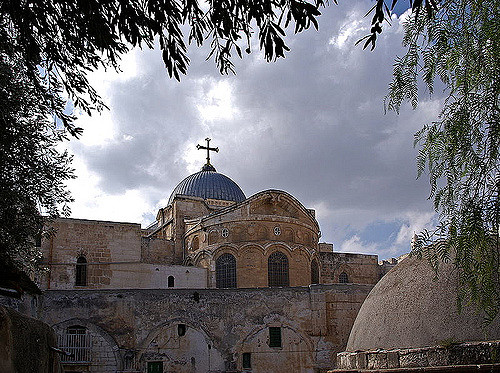Jerusalem’s famed Church of the Holy Sepulchre, the historic site of Jesus’ burial, has closed indefinitely following an argument with the Israeli government, Reuters reported. The site receives thousands of visitors and pilgrims every year.
READ: Homeless Woman Hailed as a Hero After Giving Her Life to Stop Church Shooter
In an unusual move, the Greek Orthodox, Armenian and Catholic denominations, who all share ownership of the church, agreed to closing it down. The various leaders issued a joint statement saying the move was “in protest at persistent moves to intimidate Christians and discriminate against churches in the Holy Land.”
Tensions have mounted following the Israeli government’s passing of a bill that would grant the Israeli government power to confiscate church property.
Rachel Azaria, one of the key lawmakers who sponsored the legislation, said in a statement that she agreed to delay the Israeli cabinet committee’s discussion by a week so that “we could work with the churches” to try to resolve the dispute. The committee was due to consider the bill on Sunday that would allow the state to confiscate land in Jerusalem sold by churches to private real estate firms in recent years.
In the joint, inter-denominational statement, church leaders claim that the bill is part of a wider, “systematic campaign” against both “the Churches and the Christian community in the Holy Land.”
“This abhorrent bill … if approved, would make the expropriation of the lands of churches possible,” reads the statement by Theophilos III, the Patriarch of Jerusalem, Francesco Patton, the Custos of the Holy Land, and Nourhan Manougian, the Armenian Patriarch of Jerusalem.
“This systematic and unprecedented attack against Christians in the Holy Land severely violates the most basic, ab antiquo and sovereign rights, trampling on the delicate fabric of relations between the Christian community and the authorities for decades,” the leaders claim.
The bill would also drastically restrict the rights of churches to deal independently with their own land matters and jeopardizes the church land surrounding the Jaffa gate of the Old City of Jerusalem.
The statement continues:
“These actions breach existing agreements and international obligations which guarantee the rights and the privileges of the Churches, in what seems as an attempt to weaken the Christian presence in Jerusalem. The greatest victims in this are those impoverished families who will go without food and housing, as well as the children who will be unable to attend school.”
“This reminds us all of laws of a similar nature which were enacted against the Jews during dark periods in Europe,” the leaders add.
But Jerusalem Mayor Nir Barkat took a different view, stating on Twitter that it was highly illogical to expect that church-owned commercial property, including hotels and retail businesses, would continue to be granted tax-exempt status.
Commercial buildings are not exempt from municipal taxes (arnona), regardless of their ownership. Debts on the commercial areas owned by the churches is in excess of 650 million NIS.
We will no longer require Jerusalem's residents to bear or subsidize this huge debt.
— Archive:Mayor Nir Barkat (@ArchiveNir) February 25, 2018
“Commercial buildings are not exempt from municipal taxes (arnona), regardless of their ownership. Debts on the commercial areas owned by the churches is in excess of 650 million NIS. We will no longer require Jerusalem’s residents to bear or subsidize this huge debt,” he wrote.
“Let me make it clear: we are not talking about houses of worship, who will still be exempt from property tax, according to law,” Barkat further clarified, according to Reuters. “The Church of the Holy Sepulchre—as is the case for all of Jerusalem’s churches, synagogues, and mosques —is exempt from municipal taxes. There is absolutely no change in this regard.”



